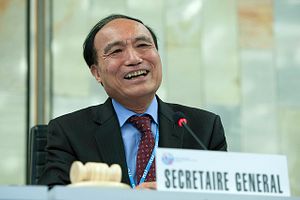After sharp controversy at the World Conference on International Telecommunications (WCIT) in Dubai in 2012, we can usefully take considerable comfort from the confluence of two related but more positive events late in 2014. On October 23, a Chinese citizen and international civil servant for the previous 28 years, Zhao Houlin, became Secretary General of the International Telecommunication Union (ITU), the parent body for the WCIT. Both the ITU and the WCIT had been riven by divisive and polarizing debates about the future of Internet governance. Then, on November 7, the ITU Plenipotentiary Conference (Plenipot for short) that elected Zhao concluded with the Busan Consensus, which encompassed a number of critical aspects of Internet governance.
According to the U.S. lead at the Plenipot, Ambassador Daniel Sepulveda, who is the State Department’s Coordinator for International Communications and Information Policy, the meeting represented an important contrast to the WCIT. “Instead of votes, there was deliberation. Instead of acrimony, there was negotiation,” he reported. The outcome was the result of hard work by those states that had opposed each other at WCIT. This was a reference to both China and the United States. Sepulveda noted that “Representatives from states with diverse policy perspectives played critical linchpin roles in the ups and downs of a dialogue that allowed us to reach agreement and work productively.”
Sepulveda implied that the main consensus regarding Internet governance was a victory for the prior U.S. position at the 2012 WCIT. The Busan meeting agreed, he said, that there would be “no changes to the ITU’s Constitution and Convention, the treaty text, thereby ensuring that its legal remit would not expand beyond telecommunications and into the Internet content or core functionality.” He also reported that “member states decided affirmatively not to increase the ITU’s role in Internet governance or cybersecurity issues, accepting that many of those issues are outside of the mandate of the ITU.”
This is only a foundational consensus on one aspect of Internet governance. It will not provide for convergence between the opposing positions of China or the United States on the main questions of Internet freedom and responsibilities. For example, in mid-January 2015, China stepped up its efforts to block its citizens’ access to Gmail. But the Busan Consensus does provide a foundation for more cooperative work between the United States and China on Internet accessibility and regulation where both sides agree, as in the need to stop cyber attacks from North Korea.
The Busan Consensus is notable because it coincided with a clear reversal away from international confrontation by Xi Jinping. That reversal began on September 2014 and was confirmed in Xi’s statements to the APEC Summit in Brisbane in November 2014, when he spoke of an “Asia-Pacific dream” premised more on cooperative security.

































